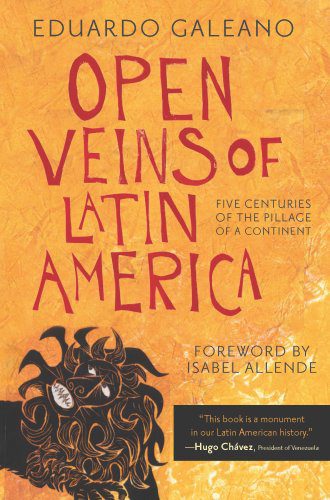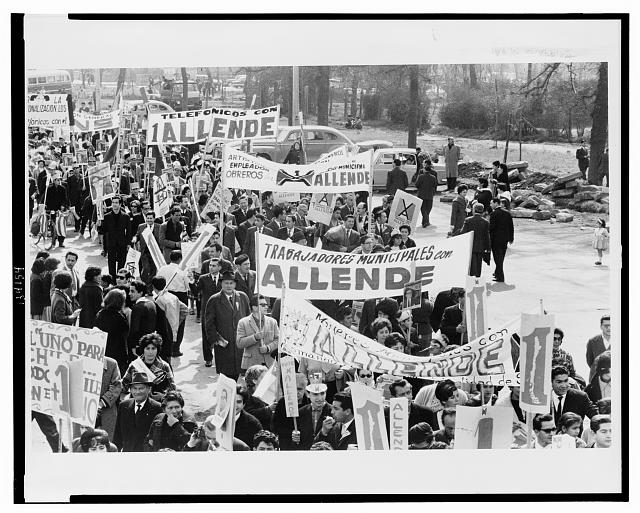by Lynn Romero
Almost forty years after its first publication, Open Veins of Latin America: Five Centuries of the Pillage of a Continent remains a relevant, if controversial, read. The book, by Uruguayan author Eduardo Galeano, follows the history of Latin America and the Caribbean through a perilous centuries-long struggle against poverty and those imperial powers whose unabashed exploitation ensure its steady existence. For Galeano, Latin America is poor precisely because it is so rich.
The book, by Uruguayan author Eduardo Galeano, follows the history of Latin America and the Caribbean through a perilous centuries-long struggle against poverty and those imperial powers whose unabashed exploitation ensure its steady existence. For Galeano, Latin America is poor precisely because it is so rich.
Galeano begins his saga of extortion with the European conquest of the Americas and the subsequent silver and gold rush. He details the atrocities of conquest that are so commonly focused upon but that never cease to shock and amaze: the enslavement of natives, the horrendously sharp decline in population, the insatiable thirst for riches that the Europeans harbored and the actions that they were willing to take in order to obtain wealth and glory. Then quite unpredictably Galeano negates the assumption that it was the Spanish conquerors that benefited from the riches extracted from the new world, but states rather that this was the beginning of a long tradition of Latin American riches being siphoned off to world superpowers and to their mighty, private investors. Galeano asserts, “The Spaniards owned the Cow, but others drank the milk. The kingdom’s creditors, mostly foreigners, systematically emptied the ‘Green Strongroom’ of Seville’s Casa de Contratación, which was supposed to guard, under three keys in three different hands, the treasure flowing from Latin America.”
The second phase of imperialism, according to Galeano, consisted in the systematic repression of Latin American industrialization, the promotion of huge monocultures for export, and the emergence of countries that were completely dependent on one raw export. This era was characterized by foreign (mainly U.S.) investors taking control of Latin American industries that tended to be lacking greatly in diversity. Galeano explains in painstaking detail the perils of countries that put all of their effort into producing one export for the benefit of foreign companies, and then who imported all of their staples and processed goods from those same foreigners. In the 1930s many countries began to nationalize their industries in an effort to retain profits. This ushered in a new phase of U.S. military and aid intervention, both of which intended to create favorable conditions for U.S. interests and stop practices, such as the nationalization of resources, that were viewed as detrimental and communist. At this point Galeano illustrates example after example of U.S. backed coups and other military actions that would have been impossible without foreign support. Eerily he dwells on the untouchability of Chile’s Salvador Allende, a Marxist who was democratically elected, and who committed suicide during a U.S. backed coup the same year as Open Veins was published.

Despite the cult following that Galeano has garnered and the religiosity with which some regard him, Galeano is not perfect. Open Veins is openly and very proudly leftist, it is at times so dense with fact its message is obscured. It lacks many a citation and it fails to meaningfully address the cause and importance of intra-country class divisions. Nevertheless Hugo Chavez of Venezuela recently proved how relevant Galeano remains when he publicly handed President Obama a copy of Open Veins of Latin America. Galeano’s is a work that must be read in order to understand today’s Latin America. His ideas, although controversial, are well researched, widely regarded, and are just as relevant today as they were when first published in 1973. Ultimately, whether or not one agrees with Galeano’s interpretation of history, the read is a valuable and insightful one that will surely spark many a conversation on just what the role of a developed nation is in the developing of another.
Photo credits:
James N. Wallace, Marchers for Allende, 5 September, 1964
U.S. News & World Report Magazine collection via Library of Congress
Check out the other winning and honorable mentions submissions for our First Annual Undergraduate Writing Contest:
Carson Stones’s review of Odd Arne Westad’s Global Cold War
William Wilson’s review of George Orwell’s Homage to Catalonia
Katherine Maddox’s review of Beirut City Center Recovery



